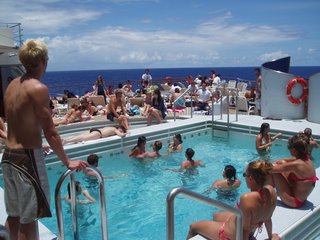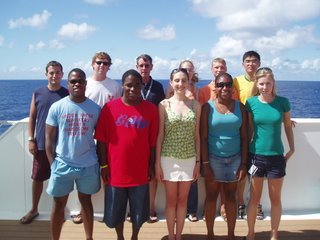Tuesday, June 27, 2006
June 25: I'm finding the rhythm of the ship, and the good news is that there's time for everything: classes, meetings, discussions, reading, relaxation, meals. The students take Global Studies (everyone is supposed to show up for this; some do not), then take two other classes of their choosing, spread out during the day. I've heard some complaining about the difficulty or length of the readings, but I'm not impressed with the whining, and in fact, think it's not only doable but also reasonable. (actually, only one student -- from Pitt-- has complained; others tell me it's "a lot" but not a problem). By 5:00 everyone is out doing exercise or napping or reading or chilling, and they reassemble again between 5 and 7 for dinner. More "free" time, then (tonight, for example, mandatory) meetings and evening activities. I'm pleasantly surprised to see more students than I thought --given the criticism I've heard-- actually sitting around the various spaces reading or writing.
The library, while small, is efficient and seemingly helpful. Lots of DVDs, videos, reference works, and of course, they have access to the internal loop that can provide materials on Toolkit. The computer lab is also small, but serviceable, and student wireless laptops can be used in any public space on the boat.
The faculty members are working hard, but everyone seems to be enjoying it. They obviously love to teach and interact with students, and most are engaging lecturers. I was lead to believe, however, that there would be NO time for individual work, but that's simply not the case. Faculty teach two courses, attend Global Studies, do 3-5 presentations in Global Studies sprinkled throughout the voyage (short ones in their areas of expertise, related to the countries being visited), and lead field programs of their choosing in ports (IES does all of the logistical work for these; faculty members need only decide what they want to do). There is time to wind down, grade, read, and do individual work. Anyone who comes prepared, even given the dramatic changes in schedule that can occur, will have no problem carving out space for reading, research, or relaxation.
June 26: Today is "No Class Day" (I've already suggested that they redub it "Reading Day," in the UVa tradition), and the students had a barbeque lunch by the pool, play and reading time, class pictures, and a social.


A number of them take time to catch up on the reading whenever they can.

There are 11 UVa students on board this summer (Pitt has the largest crew, another large one from U Colorado, then a bunch sprinkled all across the US from UCLA to Drew, U Maryland to U Washington, and dozens of spots in between. Nice kids (most of them) and they seem ready to take the academics seriously, balancing it, as is perfectly natural, with the extraordinary adventure that this is.

I just called Janna, from the telephone in my room. Bought a satellite phone card for $20, which gives you 13 minutes of quite good communication. And we're 1000 miles west of Hawaii, in the middle of the Pacific Ocean! There's a 7-hour time difference now, 8 as of tomorrow. Apparently, "Wednesday" simply disappears when we cross the International Date Line.
The library, while small, is efficient and seemingly helpful. Lots of DVDs, videos, reference works, and of course, they have access to the internal loop that can provide materials on Toolkit. The computer lab is also small, but serviceable, and student wireless laptops can be used in any public space on the boat.
The faculty members are working hard, but everyone seems to be enjoying it. They obviously love to teach and interact with students, and most are engaging lecturers. I was lead to believe, however, that there would be NO time for individual work, but that's simply not the case. Faculty teach two courses, attend Global Studies, do 3-5 presentations in Global Studies sprinkled throughout the voyage (short ones in their areas of expertise, related to the countries being visited), and lead field programs of their choosing in ports (IES does all of the logistical work for these; faculty members need only decide what they want to do). There is time to wind down, grade, read, and do individual work. Anyone who comes prepared, even given the dramatic changes in schedule that can occur, will have no problem carving out space for reading, research, or relaxation.
June 26: Today is "No Class Day" (I've already suggested that they redub it "Reading Day," in the UVa tradition), and the students had a barbeque lunch by the pool, play and reading time, class pictures, and a social.


A number of them take time to catch up on the reading whenever they can.

There are 11 UVa students on board this summer (Pitt has the largest crew, another large one from U Colorado, then a bunch sprinkled all across the US from UCLA to Drew, U Maryland to U Washington, and dozens of spots in between. Nice kids (most of them) and they seem ready to take the academics seriously, balancing it, as is perfectly natural, with the extraordinary adventure that this is.

I just called Janna, from the telephone in my room. Bought a satellite phone card for $20, which gives you 13 minutes of quite good communication. And we're 1000 miles west of Hawaii, in the middle of the Pacific Ocean! There's a 7-hour time difference now, 8 as of tomorrow. Apparently, "Wednesday" simply disappears when we cross the International Date Line.